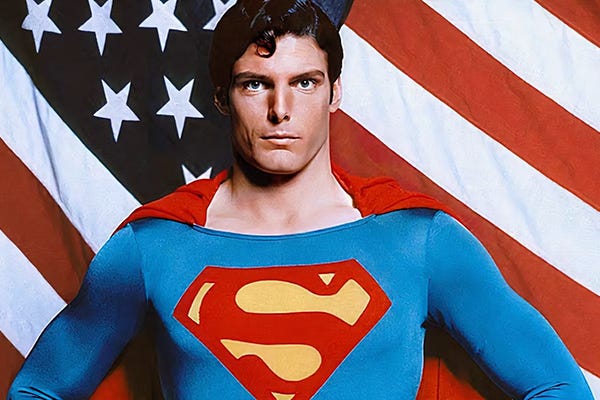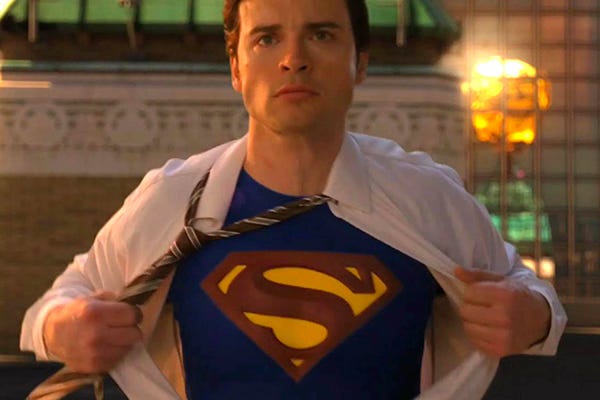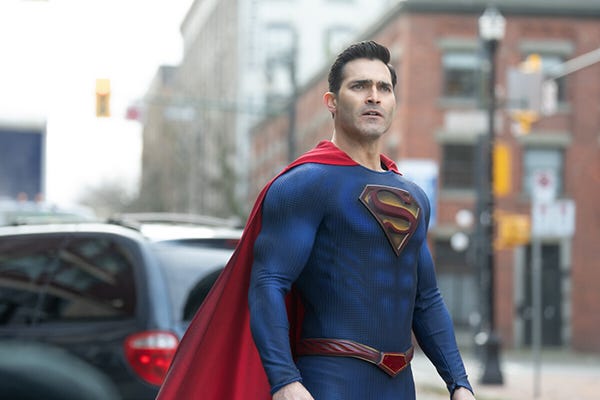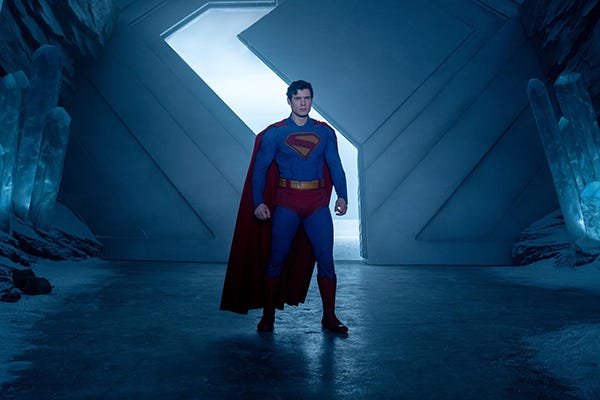Truth, Justice, and Every Era: How Superman’s Values Evolved Onscreen
From Reeves to Corenswet, Superman portrayals examine shifting key themes
Stories have been told and retold throughout human history. The biggest franchise IP brands have been reimagined time and time again–much to fans’ delight (and chagrin, depending on their relationship to the content). In true summer blockbuster fashion, a new film honoring one of our most revered superheroes hit theaters in July 2025: James Gunn’s Superman. In this film, Superman ventures to reconcile his Kryptonian alien heritage with his upbringing as Clark Kent, a human boy who becomes a newspaper reporter. It’s a story about identity and core values. But this isn’t new: every Superman story on screen (and otherwise) presents a slightly different take on identity and the character’s key values.
Each portrayal of Superman over the past 97 years has had a slightly different set of values, and the core motto of the character: “Truth, justice, and the American Way” has evolved with it. Wait–did we say nearly a century of Superman? It’s true! The character of Superman first appeared in National Periodical Publications (a direct predecessor of DC Comics) in Action Comics in 1938. Superman got his own comic book series in 1939.
Radio, TV, and film portrayals of Superman were not far behind. The first Superman on screen appeared in 1948, followed by a long list of actors who have played the man of steel. Every Superman on the big and small screen reflects the values of his time and the emotional core of the story being told, which shifts slightly in every generation or with the particular story being told. These various Supermans have contributed immeasurable influence on popular culture, so we put together a list of some of the most important values of the most famous live-action movie and TV Supermans–and how those values define their version of the character.
George Reeves – Adventures of Superman (1952–1958)
This TV show ran for six seasons, the first four in black and white. The early seasons were dark and a bit gritty, even violent in the storylines’ tones. The later seasons were in color, and with color came a lighter tone and more cartoonish scenarios resulting in Superman having to save Lois Lane and Jimmy Olsen from whatever mess they had gotten into. Throughout, Reeves’s Superman kept the following core values:
Decency
Fairness
Civic duty
This Superman is a no-nonsense protector of law and order, reflecting 1950s American ideals of virtue, stability, and personal responsibility. The actor himself was a veteran, perhaps bringing that sense of duty to his portrayal of Superman. Reeves also insisted that the actresses who played Lois Lane receive equal billing alongside him, a testament to his belief in fairness. And when a child actor appeared on the show, he made sure to treat them with the utmost respect which translated onscreen, showing kids at home watching that the child onscreen was Superman’s friend. It no doubt had a huge influence on the children watching to see Superman treating a kid like them with decency and respect.
Christopher Reeve – Superman I, Superman II, Superman III and Superman IV: The Quest for Peace (1978–1987)
We can’t have a list like this without Christopher Reeve’s iconic portrayal of Superman in four films. Reeve’s Superman is a gold standard, and his portrayal was unwaveringly good, humble, and compassionate due to the character’s own humanity as Clark Kent. Reeve’s portrayal is massively iconic to the franchise. In these highly influential movies, Superman kept the following key values:
Hope
Pure-hearted idealism
Selfless heroism
This Superman believes deeply in “truth, justice, and the American way,” calling into focus national values of the time as villain Lex Luthor hijacks military missiles to destroy symbols of American strength like the Hoover Dam and and the Golden Gate Bridge. Superman’s quest to stop Luthor is not only practical but symbolic: by stopping him, he protects the nation and its ideals. This Superman’s humanity as the adopted son of Jonathan and Martha Kent allowed him to remain grounded. His empathy translated to selfless heroism: he didn’t perform godlike acts because he was powerful, but because he cared about others. This empathetic approach served as a moral compass for viewers.
Dean Cain – Lois & Clark: The New Adventures of Superman (1993–1997)
Lois & Clark was a TV show that transformed the Superman of comic books and live action into a hero of romantic drama. Teri Hatcher’s Lois Lane was outspoken and determined, while Dean Cain’s Clark Kent was docile and emotional. This Superman had slightly different key values on display:
Romantic devotion
Dual identity as strength
Human emotion
Lois was the more determined figure in the series, focused on hard hitting journalism exposing bad guys and scandal, while Clark leaned into more human interest stories. But, of course, he was also Superman, the hero Lois–who didn’t see Clark as a love interest–was infatuated with for his strength. The audience sees Clark as a fully rounded person: a human being with a lot of heart, internal conflict, and romantic devotion to Lois, and the superhero Lois fantasizes about. For the audience, he wasn't just a savior—he was a partner, a man in love, and someone who used kindness as his greatest power. Both sides of his identity were equally important.
Tom Welling – Smallville (2001–2011)
Like Lois & Clark, Smallville focused more on the human side of Clark Kent, this time centered on his life as an average teenager with a more complicated purpose than some of his classmates. Geared towards a young adult audience, this true coming-of-age Superman narrative focused on these values:
Growth
Destiny
Personal sacrifice
Welling’s Clark is a teenager, so he is consumed by typical young adult anxieties like living up to expectations of others and impressing his peers. He constantly resists his powers until he understands what it means to use them responsibly. His identity is not a choice; his birthright is not what he might have picked for himself. Watching this show was to consume the origin story of a future hero: a boy who works through growth challenges and will become a most important figure. But to that end, young Clark couldn’t always be a “normal” teen, whatever that means: he had to embrace his own destiny, and whatever challenges or sacrifices came with it. In this series, the journey defined Clark’s character–not the cape. And these challenges were relatable to teens who were going through their own challenges with identity, growth and personal sacrifice.
Brandon Routh – Superman Returns (2006)
The Superman of Superman Returns is a classic fish out of water character. In this film, Superman returns to Earth after five years exploring his home planet of Krypton, and the world is different from the one he left. He has to prove to this new world that he is necessary once again, and to that end the film explores these values:
Loneliness
Faith in humanity
Endurance
A deeply melancholic take, Routh plays a Superman who feels like a relic—returning to a world that moved on without him. His story is about staying true to hope and love, even in isolation. His faith in humanity has to prevail. This reboot of a classic divided fans of the franchise, but it’s worth digging into themes that highlight Superman’s loneliness that might have otherwise gone unexplored. His endurance as a hero is tested, as he finds himself in need of help himself; in this film he barely even flies with the power he had in the 1980s films. Still, this film helps audiences define what “hero” actually means when things have gone a bit sideways, and how even Superman must figure out a way through it.
Henry Cavill – Man of Steel, Batman vs Superman, Justice League (2013–2023)
Henry Cavill’s Superman in several films is a man torn between two worlds, unsure if he belongs to either. In addition, this Superman has to prove himself over and over again. These are the key values presented by Cavill’s Superman:
Alienation & identity
Burdened responsibility
Sacrifice
In Man of Steel, Kal-El is sent to Earth by his parents to preserve the Kryptonian race. While he is raised by the Kents as Clark, eventually he has to face his heritage when Kryptonian military leader Zod arrives on Earth to take over the planet. Clark/Superman has to reconcile which home to save: that of his Kryptonian heritage, or humanity on Earth. The destruction of Metropolis in the ensuing battle is troubling for Bruce Wayne/Batman, which plays out in the plot of Batman vs Superman. Superman ultimately decides to sacrifice himself for the greater good, and in doing so his journey is about choosing to be a symbol of hope, not because it’s easy or expected—but because it's right, even when it costs him everything.
Tyler Hoechlin – Superman & Lois (2021–2024)
Tyler Hoechlin’s Superman from the TV show Superman & Lois is more of a family drama blended with the action of a superhero movie. In this series, Clark and Lois head back to Smallville after losing their jobs at the Daily Planet. But a quiet life isn’t that easy to come by when you’re famous: her, a renowned reporter and him–well, he’s Superman. They’re raising their teenage sons, Jordan and Jonathan, trying desperately to give them a normal life and hide Clark’s identity as Superman–which becomes more difficult as one of their sons begins to develop similar super powers. These values are the cornerstones of the series:
Fatherhood
Balance
Empathy
Parenthood certainly changes you, whether you’re a human or a superhero. This Superman is a modern family man who proves you can save the world and still be emotionally present as you battle everyday issues like navigating teenage angst and family relationships. This Superman is focused on empathy and legacy: his strength isn’t just physical—it’s his ability to connect, nurture, and lead with humility that helps him and Lois set up the next generation for success.
David Corenswet – Superman (2025)
The newest Superman film by James Gunn is a testament to the power of perception and public opinion in a world where optimism is hard to come by. David Corenswet plays a younger Superman who is trying to balance his Kryptonian identity with his human upbringing in a world where kindness is viewed as an outdated value. This Superman balances these core values:
Optimism
Modern-day relevance
Kindness
To bring Superman into the modern zeitgeist, this film tells a quintessential American story: Superman arrives on Earth from another place, and must find his place in a new world. While Gunn has been criticized by a select few for the film’s tone, it is a true immigrant story about the optimistic power of the American dream. Not only that, Superman is historically a character (created by Jewish immigrants) that is deeply entrenched in American ideals and the politics surrounding the American spirit. Superman brings his unique gifts to Earth, but Lex Luthor aims to sabotage his image and intentions to turn the public–who have lost their grip on basic kindness–against him. But once this Superman exposes Luthor’s intentions to clear his name, maybe he can lead by example. Gunn’s Superman stays optimistic for a world where people lead with kindness towards one another above all else.
Tell us if you’re seeing the new Superman, and which films/TV show portrayals you love the most! We want to hear from you in the comments.
Want to do more with your fandom? Our Discord is where you’ll find everything you need to know about our fandom-forward ecosystem at Remarkist! Don’t forget to follow us on Instagram, tumblr, and Spotify for more storyworld content—and hit that subscribe button so you never miss a thing at rmrk*st Mag!












